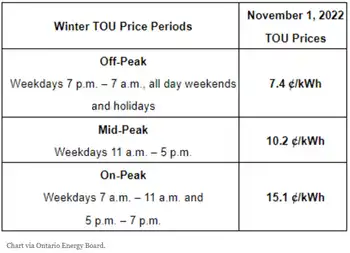Utility outline show bids would work
By Knight Ridder Tribune
Substation Relay Protection Training
Our customized live online or in‑person group training can be delivered to your staff at your location.

- Live Online
- 12 hours Instructor-led
- Group Training Available
The filing for FirstEnergy subsidiaries Ohio Edison, the Cleveland Electric Illuminating Co. and Toledo Edison outlines the process among marketers when price caps expire at the end of next year. As of Jan. 1, 2009, customers who do not purchase electricity from a competitive supplier can still buy it from the FirstEnergy subsidiary - in the Akron area, Ohio Edison. The company said the process "would minimize customers' exposure to price volatility in the electricity market by averaging the results of multiple bidding sessions conducted at different times during the year." If residential prices would go up an average of 15 percent or more, the plan provides the Public Utilities Commission of Ohio with an option to phase in the increase over time.
The bidding process and the supply for customers who continue to purchase electricity from Ohio Edison will largely not be noticed by other customers. They will continue to get bills from Ohio Edison. The process is very similar to natural gas - customers who do not purchase gas from a marketer and continue to purchase from Dominion receive a bill from the utility. But last fall, the utility began purchasing its supply for those customers through a bidding process. Customers still receive their bill from Dominion and are not told what specific supplier is providing the gas. The plan submitted to the PUCO by FirstEnergy companies also includes the development of renewable resources by designating that a portion of the supply come from sources such as solar, wind and hydroelectric power in the region.
The company proposes conducting several auctions, on a "descending clock format," that would have bid prices decline until there are enough bids to supply all customers.
FirstEnergy asked the PUCO to act on its proposal by Nov. 1 to give it adequate time to conduct the bidding. PUCO Chairman Alan Schriber said he had not had a chance to look at the proposal, but was familiar with it. He said it was possible the commission could rule by Nov. 1 as requested. Ohio Consumers' Counsel Janine Migden-Ostrander, whose office is the residential utility advocate, said the plan was a step in the right direction.
"I think the general sense is as the document coming out of the gate - obviously, we'll need to look at it more - our initial reaction is positive. We will be making suggestions," she said.
The bidding would be only for the generation portion of the electricity bill, which makes up about 40 percent of a residential bill. FirstEnergy has a separate case in front of the PUCO to increase its distribution rates, effective Jan. 1, 2009. (The distribution rates make up about 60 percent of the bill.) But customers would still see a net decrease because at the same time as the proposed rate increase, another portion of the bill, the "transition costs," will be eliminated.
That's a result of a previous regulatory decision that takes effect at the end of 2008.











